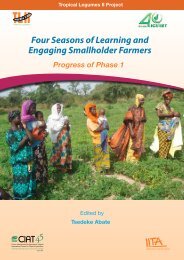Four Seasons of Learning and Engaging Smallholder Farmers - icrisat
Four Seasons of Learning and Engaging Smallholder Farmers - icrisat
Four Seasons of Learning and Engaging Smallholder Farmers - icrisat
You also want an ePaper? Increase the reach of your titles
YUMPU automatically turns print PDFs into web optimized ePapers that Google loves.
During 2010 cropping season, ICRISAT-Mali organized a field day for stakeholders on 28 October 2010<br />
at the Samanko Research Station. A total <strong>of</strong> 200 visitors (69 women <strong>and</strong> 131 men) including farmers from<br />
the various locations where PVS trials were conducted, representatives <strong>of</strong> farmers organizations, NGOs<br />
<strong>and</strong> development partners were exposed to 24 new trait-specific {(tolerant/resistant to : foliar diseases,<br />
aflatoxin contamination, groundnut rosette, drought) <strong>and</strong> confectionery} varieties sown in demonstration<br />
plots. This visit was also aired on local television <strong>and</strong> radio, thus reaching a wider audience.<br />
IER-Mali organized an on-farm field day at Sadiola <strong>and</strong> 94 farmers participated. An on-station field<br />
day at Same, chaired by the regional governor attracted 150 participants. During all these events the<br />
participants were familiarized with new varieties <strong>and</strong> other productivity enhancing technologies. A<br />
documentary film <strong>of</strong> 20 minutes was prepared in Niger based on the activities in the pilot sites to raise<br />
stakeholders’ awareness <strong>of</strong> newly released varieties. This is expected to reach a wider audience.<br />
In Nigeria, six field days/farmer meetings were held at the eight demonstration trial sites <strong>and</strong> one at<br />
Samaru before harvest. A total <strong>of</strong> 932 farmers, all men, participated in the field days. The number <strong>of</strong><br />
participants ranged from 87 to 264 per location.<br />
Variety development<br />
NARS in WCA lack human resources <strong>and</strong> infrastructure to execute an efficient groundnut breeding<br />
program. These weaknesses have limited the flow <strong>of</strong> improved varieties <strong>and</strong> farmers continue to grow<br />
old varieties that were developed or introduced more than half a century ago. One <strong>of</strong> the objectives <strong>of</strong><br />
this project is to enhance capacity <strong>of</strong> some <strong>of</strong> the NARS to breed groundnuts with multiple attributes. To<br />
this effect ICRISAT has supplied more than 600 diverse genetic materials from which to select adapted<br />
farmer-<strong>and</strong> market preferred varieties. Staff to manage the breeding programs was <strong>of</strong>fered h<strong>and</strong>s-on<br />
training in breeding principles <strong>and</strong> how to manage a breeding program including priority skills such<br />
as hybridization, data capture <strong>and</strong> analysis. The new materials have stimulated rejuvenated breeding<br />
activities <strong>of</strong> the participating NARS who have initiated national variety trials in the target ecologies.<br />
Variety trials<br />
Mali<br />
In 2008 IER received 77 traits specific advanced breeding lines (15 drought tolerant, 15 medium maturity,<br />
15 early maturing <strong>and</strong> 32 rosette resistant). These were evaluated in. replicated variety trials (4 row plots<br />
<strong>of</strong> 4 m long) along with local checks. In addition 288 F 7<br />
-F 8<br />
lines with various attributes (resistant to rosette<br />
disease <strong>and</strong> the vector aphid, resistant to early leaf spots <strong>and</strong> earliness <strong>and</strong> limited fresh seed dormancy)<br />
were supplied as observation nurseries. These were successfully conducted at the IER research station in<br />
Kayes. In 2009 IER received 19 new advanced breeding lines resistant to aflatoxin contamination for onstation<br />
testing.<br />
During the 2010 <strong>and</strong> 2011 cropping seasons, a series <strong>of</strong> advanced trials were conducted using the<br />
material selected from the observation nurseries <strong>and</strong> multi-locations on-farm trials involving promising<br />
lines from the advance trials. Overall, IER has conducted 22 observation nurseries, 11 preliminary trials,<br />
14 advanced yield trials <strong>and</strong> 5 on-farm trials.<br />
Niger<br />
INRAN-Niger, received 45 advanced breeding (15 drought tolerant, 15 medium <strong>and</strong> 15 early maturing<br />
rosette resistant) lines for replicated trials in 2008. The plot sizes <strong>and</strong> designs were similar to those in Mali.<br />
In 2009 ICRISAT-Mali, further supplied 397 breeding lines grouped into various trait-specific nurseries.<br />
These were grown at Maradi Research Station. Forty lines from the germplasm supplied in 2008 <strong>and</strong> 2009<br />
were evaluated at three locations (Tarna, Magaria <strong>and</strong> Bengou) in 2010. The yield <strong>of</strong> selected lines ranged<br />
from 14 to 42% over the checks. Among these were ICGV–SM 99502, ICGV-SM 99 510 <strong>and</strong> ICGV-SM<br />
Progress <strong>of</strong> Phase 1<br />
71

















